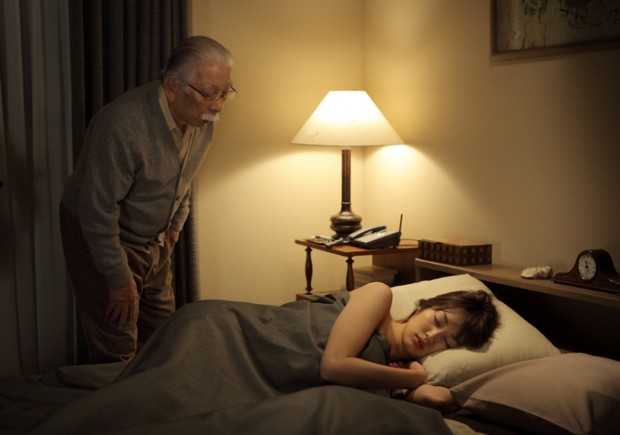Iranian filmmaker Abbas Kiarostami made a major splash at the 2010 Cannes film festival with his first feature film shot outside of his home country of Iran, Certified Copy. This year, the renowned auteur returns with his second non-Iranian production, Like Someone in Love, shot completely in Japanese amidst the neon lights of Tokyo. But shooting in a foreign country doesn’t mean the director is straying from themes that have dominated his body of work since the early ’70s. What seems to anchor Kiarostami as one of the most revered filmmakers working today is his ability to reflect the natural unexpectedness of reality by forcing us to question the identity of his characters. These thematic through-lines continue to evolve in Like Someone in Love, an enigmatic examination of the different forms of affection that people can have for one another.

The film opens in a posh cafe at night as a young woman Akiko (played with subtle charm by the ravishing Rin Takanashi) has an argument off screen with what sounds like her lover. It’s a disarming opening moment as the viewer is unsure of who is talking and the manner in which the shots are composed position the viewer as an eavesdropper at a nearby table. It soon becomes apparent after a conversation with the surly owner of the cafe that Akiko is in fact an escort and is being forced to travel an hour from the city to meet an important client. Conflicted by an unexpected visit from her concerned grandmother who she hasn’t seen in several years, Akiko is hesitant to work tonight but still reluctantly agrees to get in a taxi to meet her paying client. After arriving to her destination, she is somewhat shocked to meet a small elderly man Takashi Watanabe (played with austere sincerity by Tadashi Okuno), a professor who yearns for something more than the carnal pleasure of flesh.
What makes the film so oddly fascinating, despite the apparent simplicity of each scene, is the manner in which each character’s perception of one another is immediately challenged by their pre-conceived notions. This is made even more interesting by the formality of Japanese culture, a subtext that Kiarostami is clearly playing with. In a scene where we finally meet the hot-headed lover from the phone call in the opening scene, Noriaki (Ryo Kase) mistakes professor Watanabe as Akiko’s grandfather and asks permission to meet the rest of her family. These misunderstandings about identity harken back to similar concepts introduced in Certified Copy and give each scene a multitude of layers that will undoubtedly fuel endless discussions and dissections of the film’s ambiguous final moments.

One of the signature trademarks of a Kiarostami film are long takes of people traveling in cars, often shot through the windshield to show the reflections of the passing landscape. Beautifully lensed by Katsumi Yanagijima, the cinematography is absolutely stunning, made even more powerful by the delicate manner in which each shot is carefully composed. There is always something subtle to uncover from details in the mise-en-scene and further conveys the mysterious mannerisms that makes Kiarostami such an intrigue to watch. A subtle work of genius that will challenge audiences not patient enough to carefully absorb all the details, Like Someone in Love becomes increasingly enthralling the more one thinks about it, which is clearly the filmmaker’s intention.

